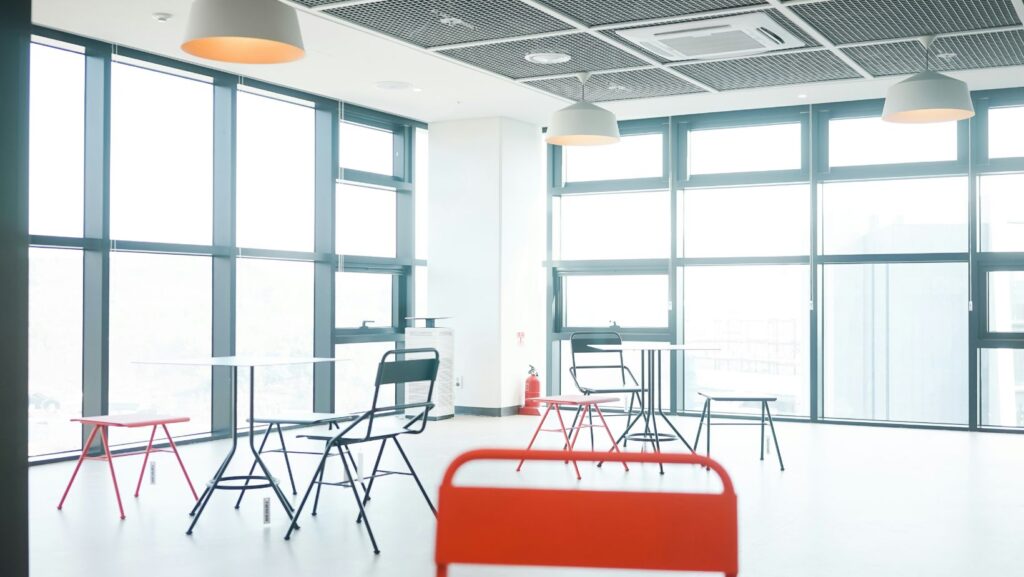Comfort in school lounge design plays a crucial role in fostering a supportive and productive learning environment. Schools are not just places for academic instruction; they are communities where students and staff spend significant portions of their day. Therefore, the design of school lounges should prioritize comfort to enhance overall well-being, encourage social interaction, and promote effective study habits. This blog post explores the importance of comfort in school lounge design, highlighting its impact on student and staff morale, engagement, and productivity.
The Importance of Comfortable Seating
Comfortable seating is a cornerstone of effective school lounge design, significantly impacting both relaxation and productivity. A well-designed lounge features seating options that cater to various needs and preferences, promoting a sense of well-being among students and staff. For instance, comfortable modular soft seating offers versatility and adaptability, allowing for various configurations that can accommodate different group sizes and activities. This type of seating not only enhances physical comfort but also encourages social interaction and informal learning, making the lounge a dynamic and inviting space. By investing in high-quality, ergonomic seating solutions, schools create environments where individuals feel supported and valued, contributing to a more positive and productive atmosphere. Ultimately, comfortable seating is essential for fostering a welcoming and functional lounge that meets the diverse needs of the school community.
Enhancing Student Well-Being
A comfortable school lounge is essential for enhancing student well-being. Students face various stresses, including academic pressure, social dynamics, and personal challenges. A well-designed lounge provides a space where they can relax, unwind, and take a break from their busy schedules. Comfortable seating, soothing colors, and a welcoming atmosphere can significantly reduce stress levels and improve mental health. When students feel comfortable and at ease, they are better equipped to handle their academic and personal responsibilities, leading to improved overall well-being.
Supporting Effective Study Habits
Comfort in school lounge design also supports effective study habits. Students need spaces that cater to different study preferences, whether they prefer quiet individual study or group collaboration. Ergonomic furniture, adequate lighting, and access to power outlets are essential elements of a comfortable study environment. When students have access to such amenities, they can focus better, retain information more effectively, and complete their assignments with greater efficiency. Comfortable study spaces also minimize distractions, allowing students to make the most of their study time.
Promoting Social Interaction
Comfortable school lounges encourage social interaction, which is vital for students’ social development. Lounges that feature cozy seating arrangements, communal tables, and open spaces create an inviting environment for students to gather, converse, and build relationships. These interactions are crucial for developing communication skills, teamwork, and a sense of community. When students have a comfortable space to connect with their peers, they are more likely to engage in meaningful conversations and collaborative activities, fostering a positive school culture.
Boosting Staff Morale
It’s not just students who benefit from comfortable school lounges; staff members do as well. Teachers and administrative staff work long hours and often face high levels of stress. Providing them with a comfortable lounge where they can take breaks, relax, and recharge is essential for maintaining high morale and job satisfaction.

Comfortable seating, calming decor, and amenities such as coffee machines and microwaves contribute to a positive work environment. When staff members feel valued and cared for, they are more likely to perform their duties with enthusiasm and dedication.
Encouraging Inclusivity
A well-designed school lounge promotes inclusivity by accommodating the diverse needs of the student body. Comfort is not one-size-fits-all; it involves considering the varying physical and sensory needs of students. For instance, providing seating options that cater to different body types and physical abilities ensures that all students can find a place where they feel comfortable. Additionally, incorporating sensory-friendly elements such as soft lighting and noise-reducing materials can make the lounge more welcoming for students with sensory sensitivities. By creating an inclusive lounge environment, schools demonstrate their commitment to supporting all students.
Facilitating Informal Learning
Comfortable school lounges facilitate informal learning, which is an important complement to formal classroom instruction. Informal learning occurs through spontaneous conversations, peer mentoring, and unstructured activities. Lounges that are designed with comfort in mind provide the ideal setting for these types of interactions. Comfortable seating arrangements and versatile spaces allow students to engage in informal learning activities, such as discussing class material, working on group projects, or seeking advice from peers. This type of learning is often more relaxed and enjoyable, making it an effective way for students to deepen their understanding of academic subjects.
Improving School Reputation
The design of school lounges can also impact the overall reputation of the institution. Parents and prospective students often judge schools based on their facilities, and comfortable, well-designed lounges leave a positive impression.

A school that invests in creating a comfortable and inviting environment demonstrates its commitment to the well-being and success of its students. This can enhance the school’s reputation and attract more students, leading to increased enrollment and community support. Additionally, a positive reputation can result in greater opportunities for partnerships, funding, and other resources that benefit the entire school community.
Adapting to Changing Needs
Comfortable school lounges are adaptable to the changing needs of the student body and staff. Schools are dynamic environments, and the needs of students and staff evolve over time. Flexible lounge designs that incorporate modular furniture, movable partitions, and multipurpose spaces can easily be reconfigured to accommodate different activities and group sizes. This adaptability ensures that the lounge remains functional and comfortable as the school community grows and changes. By designing lounges with flexibility in mind, schools can create spaces that continue to meet the needs of their users for years to come.
In conclusion, the importance of comfort in school lounge design cannot be overstated. Comfortable lounges enhance student well-being, promote social interaction, support effective study habits, boost staff morale, encourage inclusivity, facilitate informal learning, improve school reputation, and adapt to changing needs. By prioritizing comfort in the design of school lounges, educational institutions can create environments that support the holistic development of their students and staff. Investing in comfortable lounge spaces is an investment in the future success and happiness of the entire school community.



